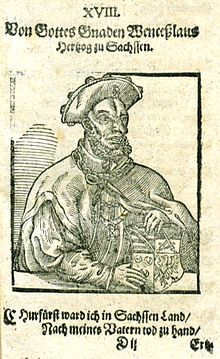Wenzel I (Saxony-Wittenberg)
Wenzel I (around 1337; † May 15, 1388 in Calenberger Neustadt ) was Duke of Saxe-Wittenberg , Prince of Lüneburg and Elector of the Holy Roman Empire. He came from the Ascanian family and ruled from 1370 to 1388.
Life
He was the youngest son of Rudolf I of Saxony-Wittenberg and his third wife Agnes von Lindow . When his father died in 1356, his older half-brother Rudolf II inherited his title and lands. When Rudolf II died in 1370 without leaving a male heir, Wenzel finally succeeded him.
He closed state peace federations with Anhalt , Magdeburg and Meißen .
In addition, Emperor Karl IV had given him the Principality of Lüneburg at the beginning of 1370, together with his nephew Albrecht von Sachsen-Wittenberg († 1385) . Albrecht was the son of his half-brother Otto († 1350) and was on his mother's side the grandson of Wilhelm II of Braunschweig-Lüneburg, who died in 1369 . The principality of Lüneburg was contested by Magnus II of Braunschweig-Wolfenbüttel , a third degree nephew of Wilhelm II, who took possession of the principality, whereupon the War of the Lüneburg Succession unfolded from 1351 . In the military conflicts in the following years, neither the Braunschweiger nor the Sachsen-Wittenbergers were able to enforce their claims, and only the Peace of Hanover in 1373 ended, at least for the time being the war. Accordingly, the Brunswick and the Wittenbergers should alternate in the reign. This contract was additionally secured by the marriage of the two eldest sons of Magnus, who died in 1373, Friedrich and Bernhard I , with the two daughters of Wenzel and the marriage of Magnus' widow to Albrecht.
In 1376, Wenceslas I took part as elector in the election and coronation of Wenceslas the Lazy as German king. On this occasion there were quarrels with Wenceslaus, Duke of Luxembourg and Brabant , an uncle of the king who, as Duke of Brabant, contested the right to carry the imperial sword before the emperor . This may have been the reason that Wenzel Kurschwerter of Erzmarschalls recorded in the arms of his family. In imperial affairs he was repeatedly active on the side of the emperor, for example in 1377 in the Altmark .
In the spring of 1388, the War of the Lüneburg Succession broke out again when the younger brother of Friedrich and Bernhard, Heinrich , resumed the armed struggle for Lüneburg. While Wenzel was besieging his opponent in his residence in Celle , he suddenly fell seriously ill and died shortly afterwards on May 15, 1388 in the new town of Hanover . Even his contemporaries suspected the administration of poison as the cause of death. He was buried in the Michaelskirche in Lüneburg .
His oldest son Rudolf III followed him in Saxony-Wittenberg . , The Principality of Lüneburg was finally awarded to his sons-in-law Bernhard and Heinrich and their heirs in a hereditary brotherhood agreement in 1389.
In older literature, his date of death was also given as August 18, 1402, but this is due to a grave mistake.
progeny
On January 23, 1376, Wenzel married Cäcilia von Carrara , daughter of Franz von Carrara (born September 29, 1325 in Padua, † October 6, 1393 in Monza) Count of Padua. They had the following children:
- Rudolf III. Elector and Duke of Saxony-Wittenberg
- Wenceslas († 1402)
- Erich († as a child)
- Anna († 1426) ∞ Friedrich von Braunschweig-Lüneburg
- Albrecht III. († 1422) Elector and Duke of Saxony-Wittenberg
- Margaret of Saxony ∞ Bernhard of Braunschweig-Lüneburg
literature
- Lorenz Friedrich Beck: rule and territory of the duke of Saxony-Wittenberg (1212-1422) . Potsdam 2000. ISBN 3-932981-63-4
- Heinrich Kühne : The Ascanians . Drei Kastanien Verlag, 1999. ISBN 3-933028-14-0
- W. von Sommerfeld: Wenzel . In: Allgemeine Deutsche Biographie (ADB). Volume 41, Duncker & Humblot, Leipzig 1896, p. 735 f.
| predecessor | Office | successor |
|---|---|---|
| Rudolf II. |
Elector of Saxony 1370-1388 |
Rudolf III. |
| Wilhelm II. |
Prince of Lüneburg (until 1385 with Albrecht ) 1370–1388 |
Bernhard I. and Heinrich I. |
| personal data | |
|---|---|
| SURNAME | Wenceslaus I. |
| ALTERNATIVE NAMES | Wenceslas I Duke of Saxony-Wittenberg |
| BRIEF DESCRIPTION | Elector of Saxony-Wittenberg |
| DATE OF BIRTH | around 1337 |
| DATE OF DEATH | May 15, 1388 |
| Place of death | Calenberger Neustadt |

